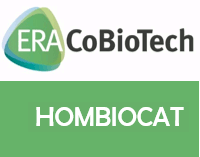On the 6th of November the HOMBIOCAT Consortium members met at CIC biomaGUNE to launch the activities of the network. The project, funded under the 1st call of the ERA CoBioTech Cofund on Biotechnologies, will focus on the fabrication of hierarchically organized multi-functional heterogeneous biocatalysts for the modular synthesis of ω-amino acids from renewable feedstocks.
The research consortium coordinated by the Ikerbasque Professor Aitziber L. Cortajarena from CIC biomaGUNE is hosted in different research institutions that provide a suitable research environment. Three academic partners; CIC biomaGUNE (Spain), University of Nottingham (UK) and Ruhr Universität-Bochum (Germany), and one industrial partner: Bioassays (Spain) to successfully address the major challenges and meet the main objectives of this project.
More information on the HOMBIOCAT project
Chemical synthesis catalyzed by enzymes is contributing to establish a modern chemistry supported on cleaner, faster and safer chemical reactions. In particular, cell-free synthetic biology (or systems biocatalysis) in solution is currently emerging as an attractive alternative to synthetic biology using whole cells because isolated enzymes do not present regulation constraints at genomic level and the intensification of the chemical fluxes do negligible effect on the system subsistence. However, it presents major issues in terms of both process- and cost-efficiency because these soluble systems often reach low chemical yields, are notably unstable and their re-usability is rather limited. In order to overcome these limitations, this proposal aims to assemble multi-enzyme systems at the nanoscale of solid and porous materials aided by protein scaffolds that guarantee the hierarchical and spatial organization of the functional modules. This immobilized multi-enzyme cascade will be utilized as heterogeneous multi-functional biocatalyst to transform renewable raw materials into omega-amino acids, in one-pot with in situ cofactor regeneration. The fabrication and exploitation of such heterogeneous biocatalyst will be achieved by i) engineering the proposed artificial pathway for the synthesis of omega-amino acids using bio-oils and diols as raw materials, ii) engineering a modular protein (consensus tetratricopeptide repeat: CTPR) as scaffolding unit to organize the multi-enzyme system at the nanoscale, iii) in vitro assembling of multi-enzyme systems onto the CTPR scaffolds, iv) immobilizing such multi-enzyme assemblies on solid particles, v) using the hierarchically organized multi-function heterogeneous biocatalysts for the efficient and sustainable production of long and short omega-amino acids vi) 10 L scale-up the process under industrially relevant conditions and vii) manufacturing of one modular kit based on DNA plasmids that express assemblies of different multi-enzyme systems and one modular kit that allows the solid-phase assembly of different functional modules based on scaffolded multi-enzyme systems. These new platforms will open an innovative tool to build sustainable pathways for chemical manufacturing of high added value molecules using renewable raw materials. The rational integration of different enzymes as functional modules with an engineered protein scaffold and a porous material as heterogeneous chassis will be addressed by combining protein engineering, surface chemistry and protein immobilization tools.
More information on the 1st CoBioTech call results
Aim of the co-funded call
The first transnational joint call for research projects (co-funded by the EC) within the framework of ERA CoBioTech aimed at biotechnology as a key enabling technology (KET), in the context of the bio-based economy to tackle 21st century societal challenges such as decarbonisation of the economy and reduction of the reliance on fossil feedstocks. Funding is granted for a maximum of three years according to national regulations.
Procedure
In a two-phase submission process 100 eligible pre-proposals were peer reviewed and ranked by a panel of international experts from 15 different countries. Based on the ranking and the available national/regional funding 41 research consortia were invited to submit a Full Proposal. After peer review and ranking of the Full Proposals by the same evaluation panel the Call Steering Committee selected 22 research consortia for funding from the ranking list again, within the limits of available national/regional and EC funding.

